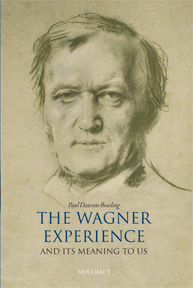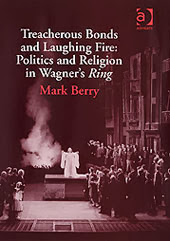Yes, it's that time again - Gramphone have announced this years shortlist. Ok, so there isn't any Wagner in the opera category and in one or two places I am having to stretch the definition of "Wagner related" but to save you having to go through the entire thing, I present you with the following selection of Wagner related nominations in this years short list: (the full list can be found here). I include samples - where I could find them. If I have missed anything, I am sure someone will let me know
DVD Documentary
At least Wagner is well presented here, with two Carlos Kleiber documentaries (his Tristan is still sitting on my turntable)
*Carlos Kleiber: Traces to Nowhere
A film by Eric Schultz Arthaus 101553
*Carlos Kleiber: I am lost to the world
A film by Georg Wübbolt C Major 705608
DVD Documentary
At least Wagner is well presented here, with two Carlos Kleiber documentaries (his Tristan is still sitting on my turntable)
*Carlos Kleiber: Traces to Nowhere
A film by Eric Schultz Arthaus 101553
*Carlos Kleiber: I am lost to the world
A film by Georg Wübbolt C Major 705608
Carlos Kleiber: Tristan Prelude (live July 25, 1972, Stuttgart)
Solo vocal
Ok, so really stretching things here:
R Strauss Lieder
Diana Damrau; Münchner PO / Christian Thielemann Virgin Classics 6286640
Diana Damrau: Strauss - Lied der Frauen
Historic
Not really that Wagner related but this disc has him performing the Magic Flute, the Don and Strauss and it is, after all, Fritz Wunderlich!
Live on Stage Various
Fritz Wunderlich Deutsche Grammophon 4779109
R Strauss Ariadne Auf Naxos (in English)
Soloists; Scottish Chamber Orchestra / Armstrong Chandos CHAN3168(2)
And finally: Gramophone Artist of the Year 2011 - the one you can vote for. Of the many fine artists here I think of particular interest to us are:
And also nominated is Tony Palmer's:
The Wagner Family A film by Tony Palmer Tony Palmer Films TPDVD172
Recital
It may be stretching the definition a bit but I feel we can include both:
R Strauss Great Strauss Scenes
Christine Brewer; Eric Owens; Atlanta SO / Donald Runnicles Telarc TEL3175502
*Verismo Arias Various
Jonas Kaufmann; Chorus and Orchestra of the Santa Cecilia Academy, Rome / Antonio Pappano Decca Classics 4782258
The Wagner Family A film by Tony Palmer Tony Palmer Films TPDVD172
Recital
It may be stretching the definition a bit but I feel we can include both:
R Strauss Great Strauss Scenes
Christine Brewer; Eric Owens; Atlanta SO / Donald Runnicles Telarc TEL3175502
*Verismo Arias Various
Jonas Kaufmann; Chorus and Orchestra of the Santa Cecilia Academy, Rome / Antonio Pappano Decca Classics 4782258
Solo vocal
Ok, so really stretching things here:
R Strauss Lieder
Diana Damrau; Münchner PO / Christian Thielemann Virgin Classics 6286640
Diana Damrau: Strauss - Lied der Frauen
DVD Performance
Franck Symphony Wagner. Fauré Orchestral works
Charles Munch ICA Archives ICAD5015
Franck Symphony Wagner. Fauré Orchestral works
Charles Munch ICA Archives ICAD5015
Historic
Not really that Wagner related but this disc has him performing the Magic Flute, the Don and Strauss and it is, after all, Fritz Wunderlich!
Live on Stage Various
Fritz Wunderlich Deutsche Grammophon 4779109
Fritz Wunderlich Recital: Mozart-Zauberfloete Tamino's Aria
Opera
Alas, no Wagner but on a related theme (kind of):
*Mozart Die Zauberflöte
Soloists, RIAS Kammerchor; Akademie für Alte Musik / René Jacobs Harmonia Mundi HMC902068/70
Alas, no Wagner but on a related theme (kind of):
*Mozart Die Zauberflöte
Soloists, RIAS Kammerchor; Akademie für Alte Musik / René Jacobs Harmonia Mundi HMC902068/70
R Strauss Ariadne Auf Naxos (in English)
Soloists; Scottish Chamber Orchestra / Armstrong Chandos CHAN3168(2)
And finally: Gramophone Artist of the Year 2011 - the one you can vote for. Of the many fine artists here I think of particular interest to us are:
Iván Fischer
Andris Nelsons
Jonas Kaufmann
5:15:00 pm | 0
comments | Read More


























